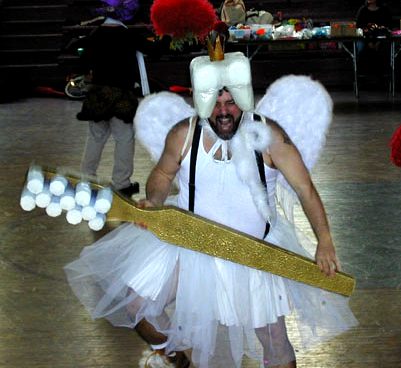
The Pomegranate Fairly. Under appreciated, overworked. Sound familiar?
Recently I heard that a fellow mom and writer's son had a pomegranate seed removed from his ear.
The mystery for his mom was that he had never, to her knowledge been near a pomegranate, let alone figured out how to peel it and stick a seed in his ear.
Of course I knew what was going on. This was the work of the pomegranate fairy.
If you haven't heard of the pomegranate fairy, you're not alone. She's often overlooked in the news because no one really eats pomegranates anymore and the tooth fairy has more extensive marketing.
 The tooth fairy's fame is in large part thanks to major contributions from dentists in an ongoing effort to bring some positive publicity to the loss of a tooth. But that's another story.
The tooth fairy's fame is in large part thanks to major contributions from dentists in an ongoing effort to bring some positive publicity to the loss of a tooth. But that's another story.(the overly hyped tooth fairy accepting a golden toothbrush award from the American Academy of Dentists)
Anyway, the legend of the pomegranate fairy goes way back to medieval times when mother, in a fit of exasperation, pleaded for divine intervention while eating a pomegranate. Her children had, for the 384th time forgotten to pick up their plates from the table, and, quite frankly she had HAD it. She hurled the pomegranate through the window, beaning a passing fairy.
This fairy, rather than fluttering on to a quieter neighborhood decided this was a sign that things were getting out of control and somebody better start listening or else!
Thus the first pomegranate was planted. Pomegranate fairies planted pomegranate seeds in children's ears so they would develop the ability to listen to their parents. Like so many things of singular importance, modern science has not determined exactly how this works, although the theory around our dinner table is that it probably has to do with the sticky, red juice.
(the pomegranate fairy, captured on a postcard in 1902)
Whatever the mechanism, the great news was that for generations children were listening to their parents, eventually leading to the birth of the greatest generation of all.
Unfortunately, with changes in fairy legislation in the 1980s requiring adherence with 13 international treaties and 94 new FDA guidelines referencing pomegranates and their use in the outer ear, fewer than seven PFs (as they are known in fairy circles) are working in the US today.
 Those valiant seven are overworked, under appreciated and just plain tired (sound familiar?) and, as with most people with way too much to do, they blow it routinely.
Those valiant seven are overworked, under appreciated and just plain tired (sound familiar?) and, as with most people with way too much to do, they blow it routinely.As a result, some of the seeds, instead of being properly planted, are slipping into the ear canals causing distress to the recipients, freaking out parents, and sending children to ENT doctors for pomegranate seed extraction.
Of course, they don't teach about the pomegranate fairy in medical schools these days, so when a seed shows up, everyone is astonished. Mothers search their gardens and children don't listen to a word that is being said until they hit their 20s.
Which explains a lot, don't you think?









